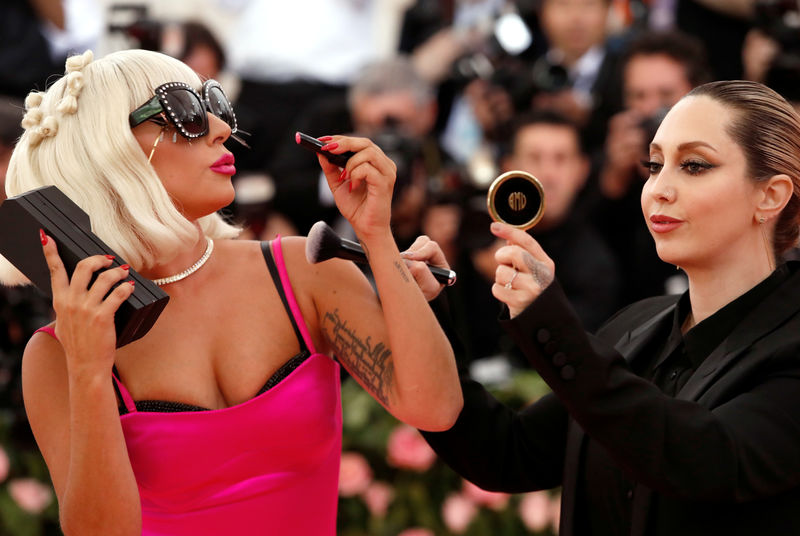By Mathieu Rosemain, Sudip Kar-Gupta and Pei Li
PARIS/BEIJING (Reuters) - Vivendi (PA:VIV) is in talks to sell up to 20% of Universal Music Group (UMG) to Tencent, valuing its prized asset at around 30 billion euros ($34 billion), as both firms look outside their core regions to expand in a recovering global music market.
While at a preliminary stage, the discussions highlight Tencent's (HK:0700) role as gatekeeper to China's growing but tightly-controlled music market and the desire of Universal, whose revenues are surging as a result of online streaming, to expand beyond its traditional markets.
Global music-streaming retail sales are expected to more than double to $45.3 billion by 2026 from $19.6 billion in 2018, UK-based media analysis firm Midea predicts.
French media group Vivendi, controlled by billionaire Vincent Bollore, said on Tuesday that Tencent would first buy 10% of Universal, the world's biggest music label ahead of Sony Music Entertainment and Warner Music and home to artists such as Lady Gaga, Taylor Swift, Drake and Kendrick Lamar.
Tencent, which already holds stakes in the world's most popular music streaming service, Sweden's Spotify (N:SPOT), and India's Gaana, as well as owning Joox, the biggest music streaming app in many major Asian markets, would also have an option to buy a further 10% of Universal.
Both groups are also "considering areas of strategic commercial cooperation", Vivendi said, raising questions among analysts over the scope of the talks and whether the French media group's main goal was to appease investors by telling them its planned sale of part of Universal was progressing.
Universal's rivals Sony Music and Warner Music also have investments in Tencent's music division Tencent Music Entertainment Group (TME), which China's biggest gaming and social media firm listed in 2018.
"It is unclear if the stake sale depends on the parallel commercial deal with TME (N:TME) and what economic transfers this deal involves," said Jerry Dellis, an analyst at Jefferies.
Dellis also said in a note to clients that U.S. political opposition to Chinese investment in what could be considered a strategic asset could obstruct a deal.
CHINESE PAYWALL
A deal with Tencent could boost Universal's presence and fit well with TME, which tends to outbid its local competitors in acquiring music copy rights in mainland China.
It would build on the initial partnership struck two years ago between the two companies, under which Tencent can license Universal's music for distribution over its streaming platforms.
Tencent's music unit also owns exclusive rights to sub-license Universal's content to other content providers in China. They worked together to build Abbey Road Studios, China, a recording studio named after the Beatles' studio in London.
Universal still generates the bulk of its revenues out of the North America and Europe, which together represented more than three quarters of the division's recorded music sales in the first half, while Asia produced only 14%.
Recorded music revenues, however, grew twice as fast in Asia at 35% as in Europe at 15% over the period and TME boasted 654 million monthly active users on its platforms subscribers at the end of the first quarter.
Spotify's monthly active users, which include its ad-supported free version, amounted to 232 million at end of June.
After a cash-burning competition to snap up music rights, China's content regulator last year demanded music streaming sites share 99% of their rights reserve with each other.
Unlike Western players such as Sweden's Spotify, Tencent Music generates only a fraction of revenue from music subscription packages, and instead relies heavily on services popular in China such as online karaoke and live streaming.
Universal and Tencent both hold shares in Spotify (K:SPOT), the world's biggest music streaming platform which has a market capitalization of about $27 billion, while the Swedish firm is a stakeholder in Tencent Music.
Tencent said at the time of its last earnings that it was adding more music behind a paywall, including popular Taiwanese singer Jay Chou, to raise revenue. But it said it might take time before Chinese users adapt to this relatively new approach.
STAKE SALE
Vivendi shares surged 7% as analysts welcomed progress on the sale of a stake in Universal and the implied valuation.
"The valuation looks good, and the progress made on the UMG deal is also positive," said Gregory Moore, fund manager at Keren Finance, which owns Vivendi shares.
Meanwhile Tencent, whose shares closed 1% lower in Hong Kong, after Vivendi's announcement, declined to comment.
Vivendi's Chief Executive Arnaud de Puyfontaine said last month that proceeds of the sale of up to 50% of Universal would be used for bolt-on acquisitions and share buybacks.
The group first said it would sell part of Universal a year ago but had made little progress until announcing last month that it had selected investment banks to start a formal sale, which should be finalised by the start of 2020.
Investment banks have estimated the business is worth anything between 17 billion to 44 billion euros.
Vivendi also said that it was continuing the process to sell further minority stakes in Universal to other partners.

Financial firms are being sounded on top of potential industrial partners, a source close to the matter said.